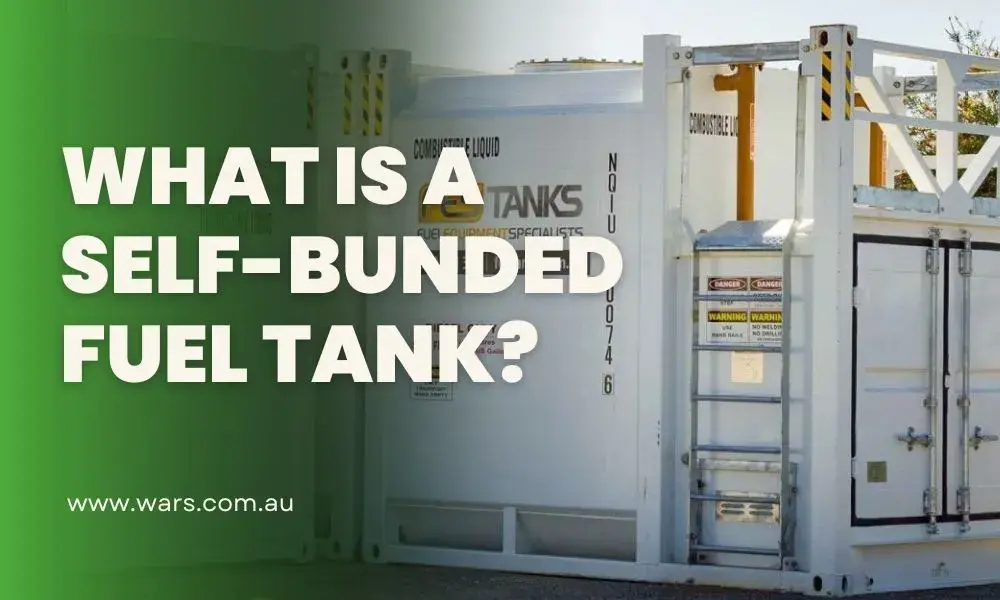
Safety is a critical issue when it comes to fuel storage. The impact of a spill, even a minor one, can cause significant damage. That’s why it’s important to store diesel and other fuels in a safe manner that will minimise spillage.
As a dangerous good, there are specific requirements regarding the storage of diesel and other fuels. When dealing with hazardous chemicals, especially in large quantities like in the mining sector, petrol stations and other major industries, having a spill containment system in place is a must.
The spill containment system is usually referred to as bunding and can be implemented in several ways. A self-bunded fuel tank is an all-in-one fuel storage and spill containment system and is a popular choice for many businesses. In this article, we’ll delve into the intricacies of self-bunded fuel tanks, exploring their design, advantages, and applications.
Understanding self-bunded fuel tanks
A self-bunded fuel tank, also known as a double-walled fuel tank, is a container specifically designed for the storage and dispensing of fuel. What sets it apart from traditional fuel storage solutions is its unique dual-layer construction. Unlike single-walled tanks, which consist of just one layer of steel or plastic, self-bunded tanks feature an inner tank encased within an outer shell. Both the inner tank and the outer shell are constructed of high-quality materials such as steel, making them robust and durable.
The space between the inner tank and the outer shell is where the term “bunded” comes into play. This space acts as a secondary containment system, effectively creating a protective barrier against leaks and spills. In the event of a breach in the inner tank, any fuel leakage is contained within the outer shell, preventing exposure, environmental contamination and minimising the risk of fire or explosion.
Advantages of self-bunded fuel tanks
Self-bunded fuel tanks are a popular storage option across many industries. Not only do they meet regulatory requirements, but they also have several other advantages over traditional storage methods:
- Enhanced safety: By providing the secondary containment for any spills, self-bunded fuel tanks significantly reduce the risk of environmental damage and personal injury resulting from fuel leaks or spills. This added layer of protection ensures compliance with stringent safety regulations and promotes a safer working environment.
- Environmental protection: One of the primary benefits of self-bunded fuel tanks is their ability to prevent fuel from seeping into the surrounding soil or waterways in the event of a leak. This helps safeguard ecosystems and prevents contamination.
- Cost savings: While the initial investment in a self-bunded fuel tank may be higher, the long-term cost savings are considerable. Businesses can benefit from reduced cleanup and remediation costs associated with spills, as well as lower insurance premiums due to improved safety measures.
- Versatility: Self-bunded fuel tanks come in various sizes and configurations to accommodate different storage requirements. Whether for above-ground or underground installation, these tanks offer flexibility and scalability to suit the needs of diverse industries, including mining, agriculture, construction, and transportation.
- Durability: Constructed from robust materials and engineered to withstand the harsh WA environmental conditions, self-bunded fuel tanks are exceptionally durable and long lasting. They are designed to resist corrosion, UV degradation, and mechanical damage, ensuring reliable performance even in demanding operating environments.
Applications of self-bunded fuel tanks
The versatility and reliability of self-bunded fuel tanks make them indispensable across a wide range of industries and applications:
- Mining: In remote mining sites where access to fuel is limited, self-bunded fuel tanks provide a convenient and secure solution for storing diesel and other fuels used to power heavy machinery and equipment.
- Agriculture: Farms and large agricultural operations rely on fuel to run tractors, generators, and irrigation systems. Self-bunded fuel tanks ensure that farmers have a reliable supply of fuel on-site, reducing downtime and enhancing productivity.
- Construction: Construction sites often require temporary fuel storage to refuel machinery and vehicles. Self-bunded fuel tanks can be easily transported and set up on-site, providing a convenient and safe refuelling solutions.
- Transportation: Trucking companies and logistics providers use self-bunded fuel tanks to store diesel for their fleets. These tanks can be installed at depots or distribution centres to ensure that vehicles are fueled up and ready for long hauls.
- Emergency response: During natural disasters or other emergencies, self-bunded fuel tanks play a crucial role in providing fuel for emergency generators, pumps, and vehicles. Their robust construction and secondary containment make them ideal for use in challenging conditions.
Need a self-bunded fuel tank? Look no further than WA Refuelling
The versatility and safety of self-bunded fuel tanks makes them a necessary asset across many industries. At WA Refuelling, we are passionate about fuel delivery and storage. Our self-bunded fuel tanks in Perth, Australia are available in a range of sizes and can be used for various applications. Contact us today to discuss your self-bunded fuel tank needs.
